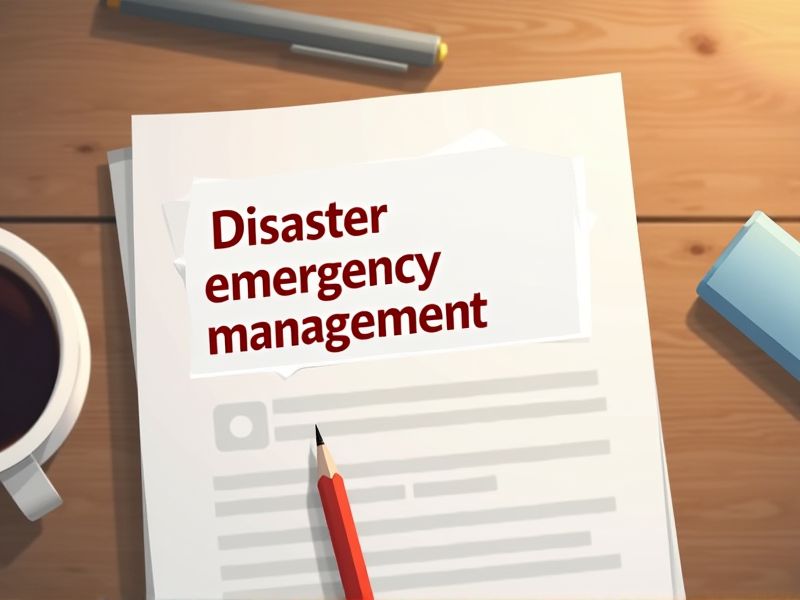
Disaster emergency management directors play a crucial role in preparing and responding to crises, where every decision can impact lives and infrastructure. Certifications provide them with specialized knowledge and skills essential for handling complex emergency scenarios effectively. They validate a director's competence in risk assessment, resource management, and policy implementation, building trust among stakeholders and communities. Here are some important certifications you may need as a disaster emergency management director.
Certified Emergency Manager (CEM)
The presence of a Certified Emergency Manager ensures a standardized level of expertise and knowledge in handling complex disaster scenarios. CEMs bring a validated skill set that enhances strategic planning, resource allocation, and response efficiency during emergencies. This credential demonstrates a commitment to continuous learning and adherence to industry best practices, fostering trust among stakeholders and the community. Employing a CEM as a Disaster Emergency Management Director results in improved coordination and resilience in disaster response efforts.
FEMA National Incident Management System (NIMS) Certification
The FEMA National Incident Management System (NIMS) Certification provides disaster emergency management directors with standardized protocols crucial for effective response coordination across agencies. By understanding and implementing NIMS guidelines, directors ensure streamlined communication during crises, minimizing confusion and delays. This certification equips directors with skills to integrate local, state, and federal resources efficiently, optimizing disaster response efforts. Credentialed directors are likely to gain trust and compliance from their teams and stakeholders, enhancing overall disaster management efficacy.
FEMA Incident Command System (ICS) Certification
FEMA Incident Command System (ICS) Certification provides the foundational knowledge essential for coordinating complex disaster response efforts effectively. It enhances communication and resource management skills, which are critical for a Disaster Emergency Management Director to work efficiently with multiple agencies. The certification establishes standardized procedures and protocols that improve decision-making and operational efficiency during emergencies. Without this certification, a director may lack the crucial competencies needed to protect communities and manage crises effectively.
Certified Business Continuity Professional (CBCP)
Certified Business Continuity Professional (CBCP) equips a Disaster Emergency Management Director with specialized skills to identify potential risks and develop comprehensive contingency plans. This certification ensures they possess a standardized level of expertise recognized both globally and within various industries. In times of crisis, a CBCP can effectively coordinate resources and processes to maintain or quickly resume critical business operations. Businesses and organizations recognize the value a CBCP brings in enhancing their resilience and reducing economic losses during disruptions.
Associate Business Continuity Professional (ABCP)
Disaster emergency management directors require an Associate Business Continuity Professional (ABCP) certification due to the comprehensive training it provides in risk assessment and mitigation strategies. This certification ensures they possess the ability to create effective continuity plans, crucial for maintaining operations during crises. The ABCP certification offers expertise in coordinating recovery efforts, which enhances an organization's resilience against disruptions. Employers often prefer or require such qualifications to guarantee that directors can protect organizational assets and ensure swift recovery post-disaster.
Project Management Professional (PMP)
Disaster emergency management directors face complex, high-pressure situations requiring effective coordination among multiple stakeholders; a PMP certification equips them with essential project management skills. The PMP framework enhances their ability to strategize, allocate resources efficiently, and adapt to rapidly changing environments, crucial for managing disaster relief operations. PMP certification emphasizes risk assessment and mitigation, critical components in developing robust emergency response plans and minimizing potential hazards. Structured project management principles help ensure efficient communication and documentation, leading to improved collaboration and accountability during crises.
Certified Safety Professional (CSP)
A Certified Safety Professional (CSP) designation equips a Disaster Emergency Management Director with specialized knowledge in safety protocols, enhancing their decision-making during crises. The rigorous training attached to the CSP ensures that directors possess the skills to effectively assess risks and implement appropriate safety measures. CSP credentialing increases the confidence of stakeholders and the public in the director's ability to manage emergencies efficiently. The credibility associated with the CSP status often facilitates better collaboration with other safety professionals and agencies.
Public Information Officer (PIO) Certification
Having a PIO Certification equips a Disaster Emergency Management Director with the skills necessary to effectively communicate with the public during crises. This certification ensures they can deliver accurate information swiftly, reducing misinformation and panic. PIO training emphasizes media relations, which enhances a director's ability to manage press interactions and public briefings. Understanding communication strategies through this certification can lead to more coordinated and efficient disaster response efforts.
Homeland Security Exercise and Evaluation Program (HSEEP) Certification
Disaster emergency management directors require HSEEP Certification to ensure a standardized approach to developing and evaluating training exercises. This certification enhances their ability to identify gaps in emergency response and improve overall preparedness. It facilitates the development of realistic, scenario-based exercises that reflect actual threats and hazards. HSEEP Certification ensures directors are aligned with federal standards, which can be critical for securing funding and resources.
Certified Risk Management Professional (CRMP)
Possessing a Certified Risk Management Professional (CRMP) credential ensures that a Disaster Emergency Management Director has comprehensive knowledge of risk identification and assessment, which is crucial for mitigating potential disasters effectively. With CRMP training, the director can develop and implement robust risk management plans, reducing the impact of emergencies. The credential equips the director with skills to navigate complex risk scenarios, fostering better coordination among emergency response teams. CRMP certification also enhances credibility and trust, reassuring stakeholders of competent disaster preparedness and management.
Summary
When you obtain certifications as a Disaster Emergency Management Director, your credibility in the field significantly enhances. This often leads to improved decision-making capacities during crises, benefiting your team and community. The certifications can open opportunities for advancement and collaboration within professional networks. Enhanced skills contribute to more efficient resource allocation and emergency response planning.
